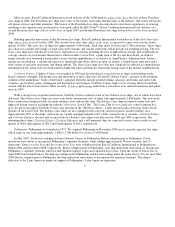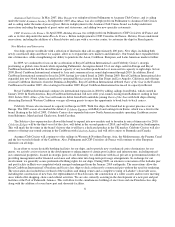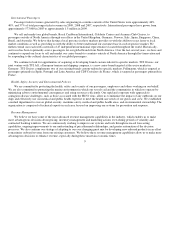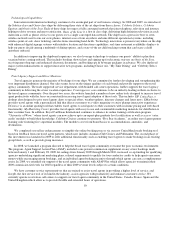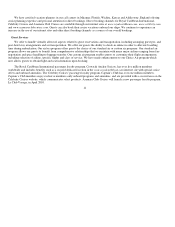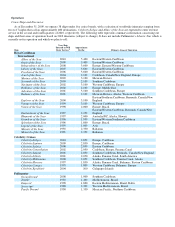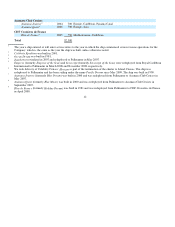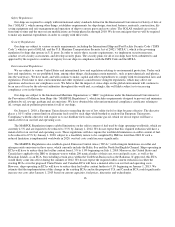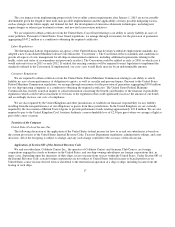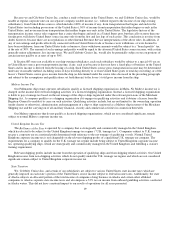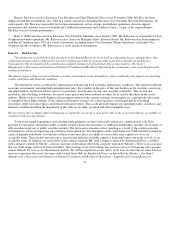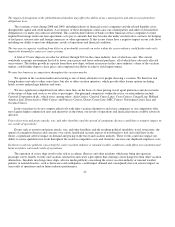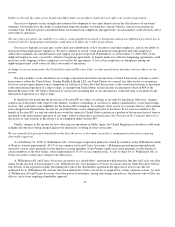Royal Caribbean Cruise Lines 2009 Annual Report Download - page 25
Download and view the complete annual report
Please find page 25 of the 2009 Royal Caribbean Cruise Lines annual report below. You can navigate through the pages in the report by either clicking on the pages listed below, or by using the keyword search tool below to find specific information within the annual report.
We also maintain insurance coverage for certain events, which would result in a delayed delivery of our contracted new ships,
which we normally place starting approximately two years prior to the scheduled delivery dates.
Insurance coverage for shoreside property, shipboard inventory, and general liability risks are maintained with insurance
underwriters in the United States and the United Kingdom.
We do not carry business interruption insurance for our ships based on our evaluation of the risks involved and protective
measures already in place, as compared to the cost of insurance. We carry business interruption insurance for certain of our shoreside
operations.
All insurance coverage is subject to certain limitations, exclusions and deductible levels. In addition, in certain circumstances,
we co-insure a portion of these risks. Premiums charged by insurance carriers, including carriers in the maritime insurance industry,
increase or decrease from time to time and tend to be cyclical in nature. These cycles are impacted both by our own loss experience
and by losses incurred in direct and reinsurance markets. We historically have been able to obtain insurance coverage in amounts and
at premiums we have deemed to be commercially acceptable. No assurance can be given that affordable and secure insurance markets
will be available to us in the future, particularly for war risk insurance.
The Athens Convention relating to the Carriage of Passengers and their Luggage by Sea (1974) and the 1976 Protocol to the
Athens Convention are generally applicable to passenger ships. The United States has not ratified the Athens Convention; however,
with limited exceptions, the 1976 Athens Convention Protocol may be contractually enforced with respect to those of our cruises that
do not call at a United States port. The International Maritime Organization Diplomatic Conference agreed upon a new Protocol to the
Athens Convention on November 1, 2002. The 2002 Protocol, which is not yet in force, substantially increases the level of
compulsory insurance, which must be maintained by passenger ship operators. No assurance can be given as to if or when the 2002
Protocol will come into force. If in force, no assurance can be given that affordable and secure insurance markets will be available to
provide the level of coverage required under the 2002 Protocol.
Trademarks
We own a number of registered trademarks related to the Royal Caribbean International, Celebrity Cruises, Pullmantur and CDF
Croisières de France cruise brands. The registered trademarks include the name “Royal Caribbean” and its crown and anchor logo, the
name “Celebrity Cruises” and its “X” logo, the names “Pullmantur Cruises” and “Pullmantur” and their logos, the name “CDF
Croisières de France” and its logo, and the names of various cruise ships. We have also filed an application to register trademarks
related to Azamara Club Cruises, which include the name “Azamara Club Cruises” and its logo. We believe trademarks related to the
Royal Caribbean International, Celebrity Cruises and Pullmantur Cruises brands are widely recognized throughout the world and have
considerable value. We also believe trademarks related to our new brands, Azamara Club Cruises and CDF Croisières de France, have
received recent recognition throughout the world and have significant value.
Regulation
Our ships are regulated by various international, national, state and local laws, regulations and treaties in force in the
j
urisdictions in which they operate. In addition, our ships are registered in the Bahamas, Malta or in the case of Celebrity Xpedition,
Ecuador. Each ship is subject to regulations issued by its country of registry, including regulations issued pursuant to international
treaties governing the safety of our ships, guests and crew as well as environmental protection. Each country of registry conducts
periodic inspections to verify compliance with these regulations as discussed more fully below. Ships operating out of United States
ports are subject to inspection by the United States Coast Guard for compliance with international treaties and by the United States
Public Health Service for sanitary conditions. Our ships are also subject to similar inspections pursuant to the laws and regulations of
various other countries our ships visit.
We believe that we are in material compliance with all the regulations applicable to our ships and that we have all licenses
necessary to conduct our business. Health, safety, security, environmental and financial responsibility issues are, and we believe will
continue to be, an area of focus by the relevant government authorities in the United States and internationally. From time to time,
various regulatory and legislative changes may be proposed that could impact our operations and would likely subject us to increasing
compliance costs in the future.
15



